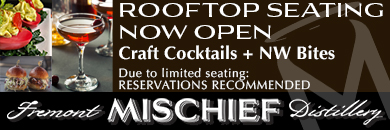
For the October 2010 general membership meeting, the Fremont Chamber of Commerce hosted a very informative meeting on Liquor Initiatives #1100 and #1105 – up for vote in the November election. Two local, and well-respected, business owners gave their perspectives – Pete Hanning, co-owner of Red Door and president of the Seattle Nightlife & Music Association, and Matt Lincecum, owner of Fremont Brewing Company who worked previously as a lawyer with a specialty in liquor licensing.
Hanning first mentioned that the State of Washington, when selling alcohol puts a 51.9% mark up on all products, before taxes. The Red Door offers over 160 different spirits for sale, but they must currently purchase every one of them from the State, which can stop carrying, raise the price or substitute any product without recourse by customers.
In his opening remarks, Lincecum tried to explain the current laws, but prefaced his remarks with the statement that, “if at the end of this description you feel totally confused, then you totally understand liquor laws.” Currently, he explained, a three-tiered system is in place, also called a ‘tied house’, with distribution, manufacture and sales kept separate. He then went on to describe ways slow erosion of this system, through approximately 375 exceptions, have corrupted efforts to maintain them separately.
Initiative 1100 throws out ‘tied house’ restrictions entirely. It allows distributors and manufacturers to offer special prices to individual customers, or on any product. For those purchasing in quantity, like Red Door, Hanning explained, “it allows me to say, ‘that price is too high, that’s not what I want,’ and go elsewhere.” Initiative 1100 will close State run liquor stores.
Both 1100 and 1105 allows retail stores, with a license, to sell liquor, which would make shopping trips more efficient for the consumer who currently have to make two or three stops simply for the ingredients for a Mojito. Hanning specifically said he does not support 1105, as it removes all current taxes, and works out to benefit only the distributors, in his opinion.
At a question from the audience, we learned that 32 states currently allow private sales with Iowa and West Virginia recently converted to privatization. As to concerns over liquor availability, Hanning pointed out that the State of Washington currently consumes more alcohol than California, which has private sales. Also, both men stated that no one know what will happen if both initiatives pass.

As a small, craft brewer, Lincecum said, the initiatives will hurt his business. Both take away protections and encouragements for small and craft breweries, especially those to come in the future. Hanning agreed with his concern, but voiced his belief that consumers, especially in this region, want craft products and will continue to give them support.
Yet, Lincecum admitted he looks forward to opportunities offered under 1100, even if “it’s going to cost me.” He believes that if the initiatives, once passed, cause problems (underage or alcoholic overconsumption) they will be repairable. Ultimately, though, “I think it is going to create a better environment.”
The thought-provoking meeting, held at Waterway Cruises with a delicious meal by Lakeside Catering, wrapped up shortly thereafter. For more information on upcoming Fremont Chamber meetings, contact Executive Director Jessica Vets at 206/632-1500 or director@fremont.com

